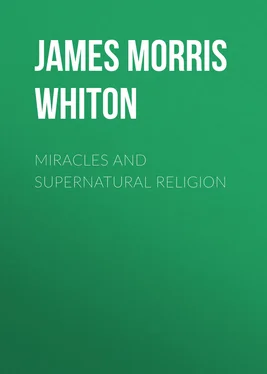James Morris Whiton - Miracles and Supernatural Religion
Здесь есть возможность читать онлайн «James Morris Whiton - Miracles and Supernatural Religion» — ознакомительный отрывок электронной книги совершенно бесплатно, а после прочтения отрывка купить полную версию. В некоторых случаях можно слушать аудио, скачать через торрент в формате fb2 и присутствует краткое содержание. Жанр: foreign_prose, foreign_religion, Философия, foreign_psychology, foreign_antique, на английском языке. Описание произведения, (предисловие) а так же отзывы посетителей доступны на портале библиотеки ЛибКат.
- Название:Miracles and Supernatural Religion
- Автор:
- Жанр:
- Год:неизвестен
- ISBN:нет данных
- Рейтинг книги:3 / 5. Голосов: 1
-
Избранное:Добавить в избранное
- Отзывы:
-
Ваша оценка:
- 60
- 1
- 2
- 3
- 4
- 5
Miracles and Supernatural Religion: краткое содержание, описание и аннотация
Предлагаем к чтению аннотацию, описание, краткое содержание или предисловие (зависит от того, что написал сам автор книги «Miracles and Supernatural Religion»). Если вы не нашли необходимую информацию о книге — напишите в комментариях, мы постараемся отыскать её.
Miracles and Supernatural Religion — читать онлайн ознакомительный отрывок
Ниже представлен текст книги, разбитый по страницам. Система сохранения места последней прочитанной страницы, позволяет с удобством читать онлайн бесплатно книгу «Miracles and Supernatural Religion», без необходимости каждый раз заново искать на чём Вы остановились. Поставьте закладку, и сможете в любой момент перейти на страницу, на которой закончили чтение.
Интервал:
Закладка:
HE cultivation of scientific and historical studies during the last century, especially in its latter half, has deepened the conviction that
"Through the ages one increasing purpose runs;"
has disposed a growing number of thoughtful minds to regard occasional signs and wonders, reported from ancient times, as far less evidential for the reasonableness of religious faith than the steady sustentation of the Providential order and the moral progress of the world. Fully convinced of this, we should now estimate, before proceeding further, the present net results of the discussion, so far as it has gone, of what is called the miraculous element in the Bible.
First, its former evidential value in proof of divine Revelation is gone for the men of to-day. The believer in a divine Revelation does not now, if he is wise, rest his case at all on the miracles connected with its original promulgation, as was the fashion not very long since. This for two reasons; chiefly this: that the decisive criterion of any truth, ethical or physical, must be truth of the same kind . Ethical truth must be ethically attested. The moral and religious character of the Revelation presents its credentials of worth in its history of the moral and religious renovations it has wrought both in individuals and in society. This is its proper and incontrovertible attestation, in need of no corroboration from whatever wonderful physical occurrences may have accompanied its first utterance. Words of God are attested as such by the work of God which they effect. It may well be believed that those wonderful occurrences—the Biblical name for which is "signs," or "powers," terms not carrying, like "miracles," the idea of something contra-natural 11 11 The Anglicized Latin word, "miracle," indiscriminately used in the Authorized Version, denotes the superficial character of the act or event it is applied to, as producing wonder or amazement in the beholders. The terms commonly employed in the New Testament ( sēmeion , a sign; dunamis , power; less frequently teras , a portent) are of deeper significance, and connote the inner nature of the occurrence, either as requiring to be pondered for its meaning, or as the product of a new and peculiar energy.
—had an evidential value for those to whom the Revelation originally came. In fact, they were appealed to by the bearers of the Revelation as evidencing its divine origin by the mighty works of divine mercy which they wrought for sufferers from the evils of the world. But whatever their evidential value to the eye-witnesses at that remote day, it was of the inevitably volatile kind that exhales away like a perfume with lapse of time. Historic doubts attack remote events, especially when of the extraordinary character which tempts the narrator to that magnifying of the marvellous which experience has found to be a constantly recurring human trait. It is simply impossible that the original evidential value of the "signs" accompanying the Revelation should continue permanently unimpaired. To employ them now as "evidences of Christianity," when the Revelation has won on ethical grounds recognition of its divine character and can summon history to bear witness of its divine effects in the moral uplift of the world, is to imperil the Christian argument by the preposterous logical blunder of attempting to prove the more certain by the less certain.
A second net result consequent on the preceding may be described as the transference of miracles from the ordnance department to the quartermaster's department of the Church. Until recently they were actively used as part of its armament, none of which could be dispensed with. Now they are carried as part of its baggage, impedimenta , from which everything superfluous must be removed. It is clearly seen that to retain all is to imperil the whole. That there are miracles and miracles is patent to minds that have learned to scan history more critically than when a scholar like John Milton began his History of England with the legend of the voyage of "Brute the Trojan." One may reasonably believe that Jesus healed a case of violent insanity at Gadara, and reasonably disbelieve that the fire of heaven was twice obedient to Elijah's call to consume the military companies sent to arrest him. Cultivated discernment does not now put all Biblical miracles on a common level of credibility, any more than the historical work of Herodotus and that of the late Dr. Gardiner. To defend them all is not to vindicate, but to discredit all alike. The elimination of the indefensible, the setting aside of the legendary, the transference of the supposedly miraculous to the order of natural powers and processes so far as vindicable ground for such critical treatment is discovered, is the only way to answer the first of all questions concerning the Bible: How much of this is credible history? Thus it is not only thoroughly reasonable, but is in the interest of a reasonable belief that divine agency is revealed rather by the upholding of the established order of Nature than by any alleged interference therewith. With what God has established God never interferes. To allege his interference with his established order is virtually to deny his constant immanence therein, a failure to recognize the fundamental fact that "Nature is Spirit," as Principal Fairbairn has said, and all its processes and powers the various modes of the energizing of the divine Will.
A third net result now highly probable is a still further reduction of the list of reputed miracles. The critical process of discriminating the historical from the legendary, and the natural from the non-natural, is still so comparatively recent that it can hardly be supposed to have reached its limit. Nor can it be stayed by any impeachment of it as hostile to Christianity, whose grand argument appeals to its present ethical effects, not to ancient thaumaturgical accompaniments. There is, however, a considerable class of cases in which the advancing critical process is likely even to gain credibility for the Biblical narrative in a point where it is now widely doubted—the resuscitations of the apparently dead. Among all the Biblical miracles none have more probably a secure historical basis.
III
Synopsis.—Arbitrary criticism of the Biblical narratives of the raising of the "dead."—Facts which it ignores.—The subject related to the phenomena of trance, and records of premature burial.—The resuscitation in Elisha's tomb probably historical.—Jesus' raising of the ruler's daughter plainly a case of this kind.—His raising of the widow's son probably such.—The hypothesis that his raising of Lazarus may also have been such critically examined.—The record allows this supposition.—Further considerations favoring it: 1. The real interests of Christianity secure.—2. The miracle as a work of mercy.—3. Incompetency of the bystanders' opinion.—4. Congruity with the general conception of the healing works of Jesus, as wrought by a peculiar psychical power.—Other cases.—The resurrection of Jesus an event in a wholly different order of things.—The practical result of regarding these resuscitations as in the order of nature.
F resuscitation from apparent death seven cases in all are recorded,—three in the Old Testament and four in the New. Some critics arbitrarily reject all but one of these as legendary. Thus Oscar Holzmann, in his recent Leben Jesu , treats the raising of the widow's son, and of Lazarus. But he accepts the case of the ruler's daughter on the ground that Jesus is reported as saying that it was not a case of real but only of apparent death,—"the child is not dead, but sleepeth." But for the preservation of this saving declaration in the record, this case also would have been classed with the others as unhistorical. And yet the admission of one clear case of simulated death, so like real death as to deceive all the onlookers but Jesus, might reasonably check the critic with the suggestion that it may not have been a solitary case. 12 12 An objection to the historicity of the raising of Lazarus which is made on the ground that so great a work, if historical, would have been related by more than one of the Evangelists, yields on reflection the possibility that Jesus may have effected more than the three raisings recorded of him. John is the sole narrator of the raising of Lazarus. But he omits notice of the two raisings recorded by the other Evangelists, while Matthew and Mark do not record the raising of the widow's son recorded by Luke. All this suggests that the record may have preserved for us specimens rather than a complete list of this class of miracles. (Compare John xxi. 25.)
The headlong assumption involved in the discrimination made between these two classes, viz. that in a case of apparent but unreal death the primitive tradition can be depended on to put the fact upon record, is in the highest degree arbitrary and unwarrantable.
Интервал:
Закладка:
Похожие книги на «Miracles and Supernatural Religion»
Представляем Вашему вниманию похожие книги на «Miracles and Supernatural Religion» списком для выбора. Мы отобрали схожую по названию и смыслу литературу в надежде предоставить читателям больше вариантов отыскать новые, интересные, ещё непрочитанные произведения.
Обсуждение, отзывы о книге «Miracles and Supernatural Religion» и просто собственные мнения читателей. Оставьте ваши комментарии, напишите, что Вы думаете о произведении, его смысле или главных героях. Укажите что конкретно понравилось, а что нет, и почему Вы так считаете.












